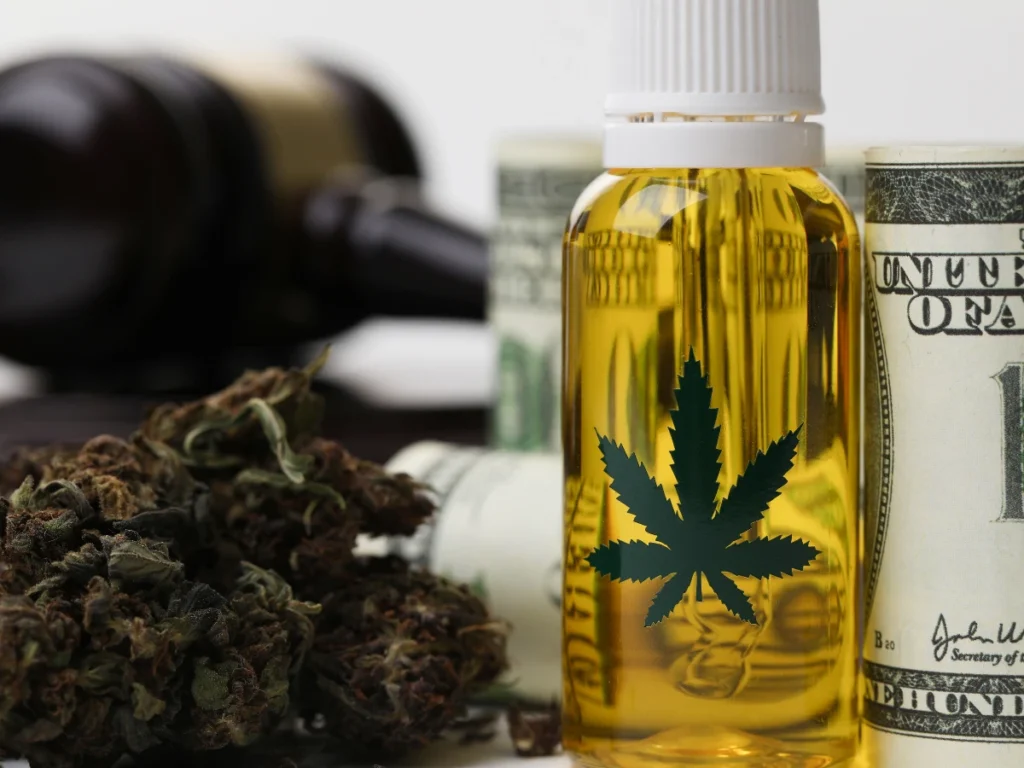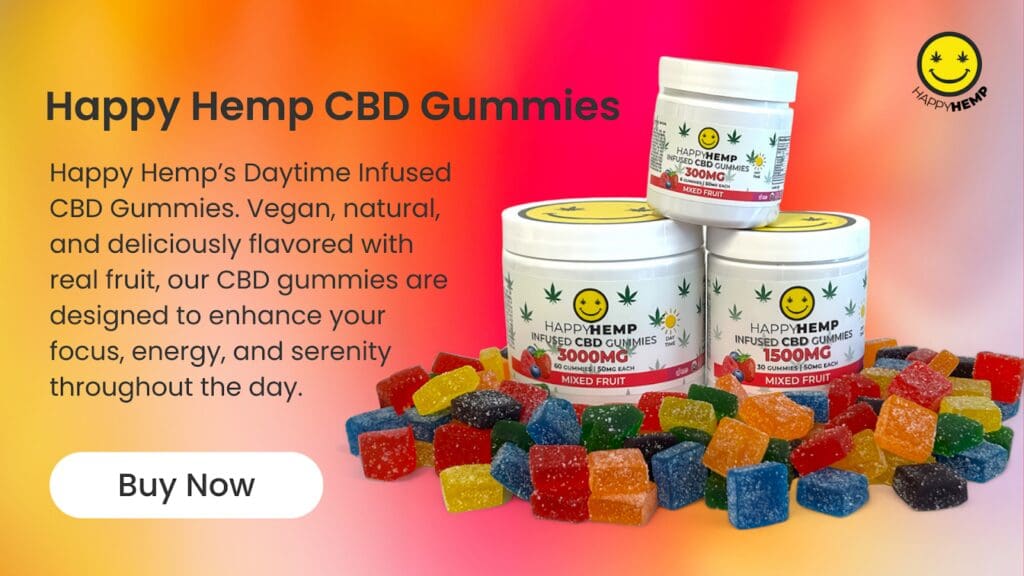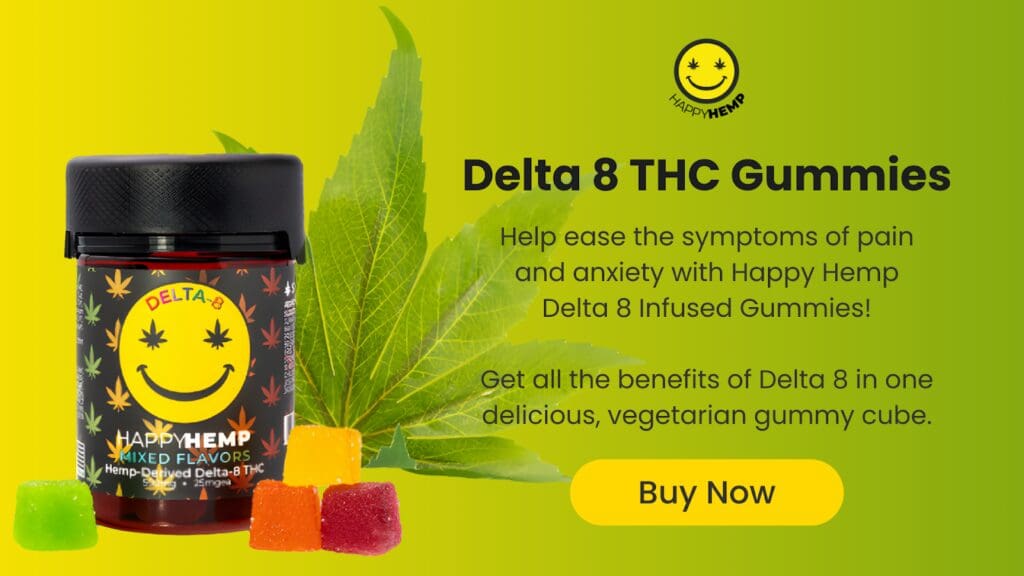Key Takeaways:
- Federal Legalization: Hemp gummies are federally legal under the 2018 Farm Bill, provided they contain no more than 0.3% THC. However, FDA regulations apply.
- State Variations: State laws on hemp gummies differ, with some imposing stricter rules or outright bans. Research your local regulations carefully.
- THC Limit: The legal status of hemp gummies depends on maintaining the 0.3% THC limit. Exceeding this threshold can make them illegal under federal law.
Are you wondering if hemp gummies are legal? As these products become more popular, knowing the laws around them is more important than ever. The 2018 Farm Bill made hemp products with less than 0.3% THC legal at the federal level, but each state can set its own rules. This creates a lot of confusion for buyers and sellers.
At Happy Hemp, we understand how confusing these laws can be. That’s why we’re committed to offering high-quality hemp products that meet federal and state standards. Our triple lab-tested gummies, oils, and other hemp products are crafted with care to ensure they’re safe, legal, and effective for our customers.
In this article, we’ll break down the legal status of hemp gummies, look at how federal and state laws differ, and explain what affects their legality. By the end, you’ll have a clear understanding of the rules and how to make informed choices when buying hemp gummies.
What Are Hemp Gummies?
Hemp gummies are edible products made from hemp, a variety of the Cannabis sativa plant known for its low levels of THC (tetrahydrocannabinol). Unlike marijuana, hemp contains no more than 0.3% THC, which is the psychoactive compound responsible for the “high” associated with cannabis. These gummies are typically infused with hemp extract, which includes beneficial compounds like CBD (cannabidiol) and other cannabinoids, terpenes, and nutrients.
Hemp gummies are popular for their potential health benefits, including promoting relaxation, improving sleep, and alleviating mild discomfort. Importantly, they are non-psychoactive, meaning they do not produce any intoxicating effects. Their popularity has led to a growing market, but their legal status can be complex, varying depending on federal and state laws.
The Legal Difference Between Hemp And Marijuana
Understanding the legal difference between hemp and marijuana is critical when discussing the legality of hemp gummies. While both come from the same plant species, Cannabis sativa, their chemical composition and legal classifications set them apart:
Hemp Vs. Marijuana: Defining THC Limits
Hemp is legally defined as cannabis containing 0.3% THC or less on a dry weight basis, while marijuana has a higher THC concentration, making it psychoactive. This distinction was established to separate non-intoxicating hemp products from marijuana, which is still classified as a Schedule I controlled substance under federal law. The low THC levels in hemp ensure it has no psychoactive effects, making it more widely accepted for industrial and health-related uses.
Impact Of The 2018 Farm Bill
The 2018 Farm Bill federally legalized hemp and its derivatives, provided they comply with the THC threshold of 0.3% or lower. This legislation removed hemp from the Controlled Substances Act, allowing for broader production and sale of hemp-derived products like gummies. However, it left significant regulatory power in the hands of individual states, leading to a patchwork of differing laws across the U.S.
State Vs. Federal Legal Standards
Despite federal legalization, some states enforce stricter regulations on hemp products, creating potential confusion for consumers and businesses. These laws may limit THC levels further, restrict certain cannabinoids, or ban specific product formats like edibles. Understanding these state-by-state nuances is crucial for ensuring compliance and avoiding legal issues with hemp gummies.
Understanding The Legal Status Of Hemp-Derived Products
The legal landscape for hemp-derived products, including gummies, is shaped by federal and state laws. While the 2018 Farm Bill marked a significant step in legalizing hemp, the regulation of hemp products remains complex and varies by jurisdiction. Here’s what you need to know about their legal status:
Federal Legalization Under The 2018 Farm Bill
The 2018 Farm Bill removed hemp and its derivatives from the list of controlled substances, provided they contain no more than 0.3% THC. This legalization allowed hemp cultivation and the production of hemp-derived goods, including gummies, across the United States. However, federal law does not override stricter state laws, which can still prohibit the sale or consumption of these products.
State-Specific Regulations
State governments retain the right to regulate hemp products independently, resulting in a patchwork of laws across the country. Some states fully legalize hemp gummies, while others impose bans or restrictions on certain types of products, particularly those containing CBD. It is essential for consumers to understand their local laws to ensure compliance when purchasing or using hemp-derived gummies.
The Role Of The FDA In Hemp Product Regulation
The FDA oversees the use of hemp-derived ingredients in food and dietary supplements but has not formally approved CBD or other hemp extracts for these purposes. This regulatory ambiguity creates challenges for manufacturers, who must navigate labeling and marketing rules, and for consumers seeking clarity on product safety and legality. Until clear guidelines are established, the legal status of many hemp-derived products remains uncertain.
Federal Laws Surrounding Hemp Gummies
Federal laws play a central role in determining the legality of hemp gummies across the United States. These laws primarily stem from the 2018 Farm Bill and regulatory oversight from the Food and Drug Administration (FDA), shaping the legal framework for production, distribution, and consumption of these products:
The 2018 Farm Bill And Hemp Gummies
The 2018 Farm Bill legalized hemp and its derivatives at the federal level, provided the THC content does not exceed 0.3%. This legislation allows hemp gummies to be cultivated, processed, and sold as long as they meet these standards. However, the Farm Bill does not automatically legalize the use of hemp gummies nationwide, leaving room for state-specific regulations to come into play.
FDA Oversight On Hemp Products
The FDA regulates the marketing and safety of hemp gummies, particularly those containing CBD. While hemp-derived CBD is no longer a controlled substance, the FDA has yet to formally approve its use in foods or dietary supplements. This regulatory gap means manufacturers must navigate unclear federal guidelines while ensuring their products meet quality and labeling standards.
Restrictions On Health Claims
Federal laws prohibit unsubstantiated health claims on hemp gummy packaging, requiring manufacturers to avoid misleading consumers. Claims suggesting that hemp gummies cure or prevent diseases are not allowed unless backed by rigorous scientific evidence approved by the FDA. These restrictions aim to protect consumers from false advertising while ensuring compliance with federal regulations.
State Laws: Do They Vary?
Yes, state laws regarding hemp gummies vary widely, creating a patchwork of regulations across the United States. While the 2018 Farm Bill legalized hemp at the federal level, it also granted states the authority to implement their own rules. As a result, the legality of hemp gummies can differ depending on where you live:
States With Favorable Laws
Many states have fully embraced hemp and its derivatives, allowing the sale and consumption of hemp gummies as long as they comply with the federal THC limit of 0.3%. These states often have clear regulatory frameworks to guide manufacturers and consumers.
States With Restrictions
Some states, despite federal legalization, impose stricter rules. For instance, they might limit the types of hemp products that can be sold or require additional licensing for producers and retailers.
Prohibited States
A handful of states continue to enforce bans or significant restrictions on hemp-derived products like gummies. These restrictions may stem from concerns about product safety, THC testing, or difficulty distinguishing between hemp and marijuana.
Factors That Influence The Legality Of Hemp Gummies
The legality of hemp gummies depends on several critical factors, which vary by jurisdiction and regulatory frameworks. These considerations determine whether the product can be legally manufactured, sold, or consumed. Here are the primary factors that influence the legal status of hemp gummies:
THC Content
The THC concentration in hemp gummies is one of the most important factors affecting legality. According to federal law, the product must contain no more than 0.3% THC to qualify as hemp; otherwise, it is considered marijuana, which is illegal in many states. Manufacturers must ensure their products undergo rigorous testing to meet this legal threshold and avoid misclassification as a controlled substance.
Source Of Hemp
The origin of the hemp used in gummies is another determinant of legality. Hemp-derived gummies, which use extracts from hemp plants, are federally legal, whereas products derived from marijuana plants fall under stricter legal controls. Ensuring the hemp is sourced from compliant farms and meets USDA standards is vital for the product to remain within the boundaries of the law.
State Regulations
While federal law provides a baseline for hemp product legality, state laws often impose additional requirements or restrictions. Some states have embraced hemp gummies fully, permitting their sale and consumption, while others implement more stringent rules or outright bans. Consumers and producers must navigate these differences to ensure compliance with both local and federal guidelines.
Labeling And Marketing
Proper labeling and marketing of hemp gummies are essential to avoid regulatory issues. The FDA prohibits manufacturers from making unverified health claims or presenting their products as cures for medical conditions without approved evidence. Accurate labeling that includes THC content, ingredients, and certifications helps protect consumers and ensures compliance with regulatory standards.
Testing And Certification
Many states mandate third-party testing to confirm the safety and legal compliance of hemp gummies. Testing ensures the product’s THC levels are within legal limits, free of harmful contaminants, and accurately labeled. Products that lack certification may face legal challenges or consumer distrust, making testing an indispensable part of the production process.
Final Thoughts
The legality of hemp gummies is a complex issue shaped by federal regulations, state-specific laws, and oversight from agencies like the FDA. The 2018 Farm Bill legalized hemp and its derivatives at the federal level, provided they contain no more than 0.3% THC. However, the legal landscape is far from uniform, as state laws and regulations vary widely. Factors such as THC content, sourcing, and compliance with labeling and safety standards play a crucial role in determining whether hemp gummies are legally produced, sold, and consumed.
For consumers, it’s essential to research and understand the laws in their state to avoid potential legal complications. Choosing products that meet legal requirements, such as proper labeling and third-party testing, is equally important. For manufacturers, maintaining transparency and ensuring compliance with regulations is critical for building trust and operating within the law. As the hemp industry continues to grow and evolve, staying informed about ongoing legislative changes will help consumers and producers navigate this dynamic market confidently.
Read Also:
- Microdosing CBD: Maximizing Wellness Benefits Through Smaller, Consistent Doses
- The Cannabis Health Effects: Unveiling the Potential
- What Does CBD Feel Like? A Simple Guide
Frequently Asked Questions About Hemp Gummies Legality
What are hemp gummies made from?
Hemp gummies are made from hemp extract, which may include cannabinoids like CBD, terpenes, and other nutrients. They typically do not contain psychoactive levels of THC. The ingredients are often combined with sweeteners and flavors to create an edible treat.
Are hemp gummies the same as CBD gummies?
Hemp gummies and CBD gummies are similar but not identical. Hemp gummies may include full-spectrum hemp extract or just CBD, depending on the product. CBD gummies specifically focus on cannabidiol as the main ingredient.
Can hemp gummies cause a positive drug test?
Most hemp gummies should not cause a positive drug test if they meet the legal THC limit of 0.3%. However, trace amounts of THC may accumulate with heavy use. It’s important to verify the product’s THC content through third-party testing.
Are hemp gummies safe for children?
The safety of hemp gummies for children is not well-established, and most are not marketed for minors. Parents should consult a pediatrician before giving hemp-derived products to children. Always choose products with verified ingredients and clear labeling.
Do hemp gummies have side effects?
Hemp gummies are generally well-tolerated, but some users may experience mild side effects like dry mouth or drowsiness. These effects vary depending on individual sensitivity. Starting with a low dose is recommended to gauge personal tolerance.
Are hemp gummies legal internationally?
Hemp gummies’ legality varies by country, as international laws differ widely. Some countries have strict regulations even for hemp products with minimal THC. It’s crucial to research the specific laws of the country you are in or visiting.
Do you need a prescription to buy hemp gummies?
In most cases, you do not need a prescription to purchase hemp gummies. They are commonly sold as over-the-counter supplements or edibles. However, local laws may impose additional restrictions.
Are hemp gummies vegan-friendly?
Many hemp gummies are made with vegan-friendly ingredients, but it depends on the brand. Check the label for animal-derived products like gelatin. Vegan options often use plant-based alternatives like pectin.
Can hemp gummies be shipped to all states?
While federal law allows shipping hemp products with less than 0.3% THC, some states restrict such shipments. Always check the recipient state’s regulations before ordering. Many companies provide detailed shipping information to ensure compliance.
What makes hemp gummies different from marijuana edibles?
Hemp gummies are made from hemp, which contains less than 0.3% THC and is non-intoxicating. Marijuana edibles contain higher THC levels and can produce psychoactive effects. The key distinction lies in the source plant and THC concentration.
Sources:
- Mead, A. (2017). The legal status of cannabis (marijuana) and cannabidiol (CBD) under U.S. law. Epilepsy & Behavior, 70, 288–291. https://doi.org/10.1016/j.yebeh.2016.11.021
- Alharbi, Y. N. (2020). Current legal status of medical marijuana and cannabidiol in the United States. Epilepsy & Behavior, 112, 107452. https://doi.org/10.1016/j.yebeh.2020.107452
- Vlad, R., Hancu, G., Ciurba, A., Antonoaea, P., Rédai, E., Todoran, N., Silași, O., Muntean, D., & Hancu, G. (2020). Cannabidiol -therapeutic and legal aspects. Pharmazie, 463, 463–469. https://doi.org/10.1691/ph.2020.0076
- Grinspoon, P. (2024, April 4). Cannabidiol (CBD): What we know and what we don’t. Harvard Health Blog; Harvard Health Publishing. https://www.health.harvard.edu/blog/cannabidiol-cbd-what-we-know-and-what-we-dont-2018082414476









